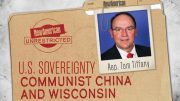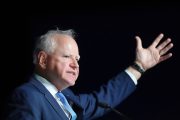President Barack Obama, who once called the U.S. Export-Import bank “little more than a fund for corporate welfare,” urged business owners Saturday to press members of Congress to renew the bank’s charter, due to expire on September 30. Expiration of the charter would mean the end of the bank and its ability to help finance U.S. exports with loans to foreign customers at below-market interest rates, with the American taxpayers stuck for the bill whenever loans are not repaid.
The charter has been renewed by Congress more than 40 times though the 80-year history of the bank, which was created in 1934 by executive order of President Franklin Roosevelt. But the massive government bailout of the financial industry in 2008-2009 planted the seeds of a growing mistrust of the alliance between big government and big business — sometimes called “corporate welfare” — particularly within the Tea Party movement, which has taken root and grown into a political force since the bailouts.
Opposition had been building as well among members of Congress willing to let the bank become history at the end of next month — a movement the president tried to blunt with his remarks Saturday.
“If Congress fails to act, thousands of businesses, large and small, that sell their products abroad will take a completely unnecessary hit,” Obama insisted. The president has issued previous calls for the bank’s renewal, including one in June that prompted Zachary Goldfarb of the Washington Post to recall that then-Senator Obama sounded much like today’s Tea Partiers knocking “crony capitalism” when he spoke about the Ex-Im Bank while a candidate for president in 2008. At a campaign event in Green Bay, Wisconsin, in September of that year, at about the time the financial crisis had come to a head, Obama spoke of programs dear to the hearts and bank accounts of powerful special interests, but with considerable costs and little benefit to the taxpaying public that is forced to stand behind them.
“We did not arrive at this moment by some accident of history,” Senator Obama said in Green Bay in 2008. “We are in this mess because of a bankrupt philosophy that says we should give more and more to those with the most and hope that prosperity trickles down to the rest of us.” The Democratic nominee promised to be a different type of president, one who would not maintain wasteful programs to preserve the status quo and promote a burgeoning bureaucracy.
I am not a Democrat who believes that we can or should defend every government program just because it’s there. There are some that don’t work like we had hoped, like the Bush Administration’s billion-dollar-a-year reading program that hasn’t improved our children’s reading. And there are some that have been duplicated by other programs that we just need to cut back, like waste at the Economic Development Agency and the Export-Import Bank that has become little more than a fund for corporate welfare….
As president, I will go through the entire federal budget, page by page, line by line, and I will eliminate the programs that don’t work and aren’t needed.
As Goldfarb pointed out, a video of those remarks was put online by the conservative Club for Growth in 2012, but the political world appeared to take little notice, and Congress that year renewed the bank’s charter for another two years. But anti-Ex-Im sentiment seems to be popular with the voters this year and is growing among influential members of Congress.
George Will and Michael Barone are among the pundits who attribute the stunning Republican primary defeat in June of House Majority Whip Eric Cantor of Virginia by college professor David Brat to Cantor’s support of, and Brat’s opposition to, the Ex-Im bank, along with the incumbent’s support for the Senate’s comprehensive immigration reform bill. Not surprisingly, Cantor’s successor as deputy majority leader, Kevin McCarthy of California, opposes reauthorization.
Rep. Justin Amash (R-Mich.), though heavily outspent by a primary opponent backed by the Republican leadership and the U.S. Chamber of Commerce, won his primary this month by campaigning against “corporate welfare,” including the Export-Import Bank.
House Financial Services Committee Chairman Jeb Hensarling (R-Texas), in a statement issued Saturday, called the Ex-Im Bank “foreign corporate welfare” that benefits mainly “a handful of powerful politically connected corporations.”
Indeed, it could almost be called the Bank of Boeing, since more than 82 percent of Ex-Im-financed loans in 2012 went to customers of the Chicago-based giant of the aircraft and aerospace industry. Other large corporations taking advantage of the program include household names such as Caterpillar, Inc. and General Electric Company. Some of Boeing’s customers are foreign competitors of U.S. carriers, making those Ex-Im loans unpopular with companies such as Delta Airlines.
Delta Senior Vice President Andrea Fischer Newman wrote this to Hensarling this week: “If left to do business as usual, the Bank has proven that it will continue to help all foreign airlines indiscriminately, including well-funded and state-supported ones that competitively threaten U.S. airlines and their employees.” Hensarling also heard from a Boeing official who argued that without the Ex-Im financing, airlines around the world would buy the European Airbus planes, often with French or German export credit subsidies.
“The U.S. aerospace industry would lose sales and market share, and the jobs associated with that lost business would end up in Europe,” Boeing senior vice president Tim Keating wrote the Financial Services Committee chairman last week. The bank’s critics argue that Boeing could find financing in private markets.
Politico reported that Senator Joe Manchin, a Democrat from coal-producing West Virginia, is pushing legislation to renew the charter five years and increase the bank’s lending capacity while including a provision to expand the number of countries where Ex-Im can finance coal-fired power plants. The proposal would overturn restrictions put in place by the Obama administration limiting the bank’s financing for coal-fired plants to buyers in only the world’s poorest countries.
Rep. John Campbell (R-Calif.), chairman of the Subcommittee on Monetary Policy and Trade, has drafted a bill for a three-year renewal of the charter with reforms designed to increase the bank’s efficiency, reduce the risk to taxpayers, and ensure that the Ex-Im Bank is the lender of last resort. “A reauthorization with reforms, in my view, is the only thing actually that could get 218 votes and pass the House floor,” Campbell told Politico.
Another reason to oppose renewal of the charter is no less important for the scant attention it receives. It is a point raised strenuously by Jefferson and Madison in their battle against the establishment of a Bank of the United States. The Constitution nowhere gives the federal government authority to create a bank. That consideration, of course, has not prevented the presidents and members of Congress, past and present, from creating and perpetuating any number of programs and institutions for which there is no constitutional authority.
The Constitution appears to be a document “more honored in the breach than the observance.”




